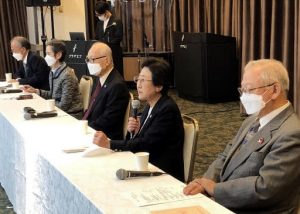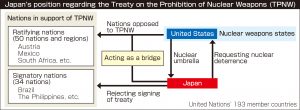Nuclear ban treaty to enter into force, Part 1: Japanese government clings to policy of national security based on nuclear deterrence
Oct. 27, 2020
by Junji Akechi, Staff Writer
The Treaty on the Prohibition of Nuclear Weapons (TPNW), which comprehensively bans nuclear weapons, from their development to use, will enter into force next year, on January 22, as the number of ratifying nations and regions reached 50. The international groundswell of debate focusing on the inhumane nature of nuclear weapons finally bore fruit in the form of a treaty. Although A-bomb survivors and citizens’ groups welcomed the news of the treaty’s effectuation as a major step toward the elimination of nuclear weapons, the A-bombed nation of Japan, as it terms itself, continues to turn its back on the treaty. In this feature, the Chugoku Shimbun delves into the domestic and international challenges facing the treaty.
On October 26, the day after the news broke that the TPNW was set to enter into force, Katsunobu Kato, Japan’s Chief Cabinet Secretary General, once again rejected Japan’s participation in the treaty at a regular press conference. “The treaty’s approach differs from that of Japan,” Mr. Kato said, as he matter-of-factly repeated Japan’s stance of playing the role as bridge between nuclear weapon states and non-nuclear weapon states by advocating a phased nuclear disarmament approach.
Hibakusha express outrage
Terumi Tanaka, 88, co-chairperson of the Japan Confederation of A- and H-Bomb Sufferers Organizations (Nihon Hidankyo), spoke angrily at a press conference on the same day. “I lost five family members in the atomic bombing and saw many people suffering and in pain. That experience is my starting point. When I think of how our government simply repeated its previous statements without any consideration, my blood boils.” Michiko Kodama, 82, the group’s assistant secretary general said, “I hope the Japanese government will set out a path for complete nuclear abolition at the very least while A-bomb survivors are still alive.” An enormous gulf exists between the survivors, who call for abolition of nuclear arms as soon as possible, and the Japanese government, which rejects the treaty based on the justification of realistic national security.
In its policies related to national security, Japan places emphasis on the nuclear umbrella provided through the nuclear force of the United States, and consistently adopts a stance of opposition to the treaty. Japan did not participate in the conference held at the United Nations for negotiating establishment of the TPNW in 2017. In its basic defense program released in 2018, Japan clearly states that U.S. nuclear deterrence is indispensable, clarifying its reliance on the philosophy of nuclear deterrence.
Japan’s two-faced attitude can no longer be hidden
Nevertheless, the TPNW renounces the existence of nuclear weapons due to their inhumane nature. Keiko Nakamura, associate professor at the Research Center for Nuclear Weapons Abolition (RECNA) of Nagasaki University, analyzed the situation thusly: “Possession of nuclear weapons will be an impossible option, and relying on them will go out of fashion. Once the treaty comes into effect, the world’s consciousness about nuclear weapons will be transformed in the same way. It has now become difficult for Japan to hide its two-faced nature, relying on U.S. nuclear force despite being the A-bombed nation.” She added emphatically, “Japanese people need to take such a situation to heart and begin to embark on action to alter the government’s mindset.”
A movement has already begun aimed at changing the Japanese government’s obstinate attitude. “Kaku seisakuwo shiritai Hiroshima wakamono yukenshano kai” (Kakuwaka Hiroshima) is a group composed mainly of young people in Hiroshima who are actively learning about nuclear policies as voters. From a pro-treaty perspective, the group has worked on activities to ask locally elected Diet members about their stance regarding such policies. Since the group’s establishment in January 2019, it has reached out to 15 lawmakers by telephone or written letter and met in person seven members from both the ruling and opposition parties.
Miho Tanaka, 26, is co-leader of the group and a company employee and resident of Hiroshima’s Nishi Ward. “We have come to understand that opinions are split about whether to agree on the treaty or not, even among Diet members of the ruling Liberal Democratic Party (LDP), and that they have diverse views about the treaty,” said Ms. Tanaka. “It’s natural they have different ways of thinking from us, but it’s important for us to kick off discussion with them anyway as a first step.” With the determination that the treaty will enter into force, her group will continue to push ahead with dialogue. “I’m sure we can make a change if we keep raising our voices.” The group is exploring how to work as a bridge to realize ratification of the treaty by the A-bombed nation of Japan.
(Originally published on October 27, 2020)
Movement underway to promote reforms through dialogue
The Treaty on the Prohibition of Nuclear Weapons (TPNW), which comprehensively bans nuclear weapons, from their development to use, will enter into force next year, on January 22, as the number of ratifying nations and regions reached 50. The international groundswell of debate focusing on the inhumane nature of nuclear weapons finally bore fruit in the form of a treaty. Although A-bomb survivors and citizens’ groups welcomed the news of the treaty’s effectuation as a major step toward the elimination of nuclear weapons, the A-bombed nation of Japan, as it terms itself, continues to turn its back on the treaty. In this feature, the Chugoku Shimbun delves into the domestic and international challenges facing the treaty.
On October 26, the day after the news broke that the TPNW was set to enter into force, Katsunobu Kato, Japan’s Chief Cabinet Secretary General, once again rejected Japan’s participation in the treaty at a regular press conference. “The treaty’s approach differs from that of Japan,” Mr. Kato said, as he matter-of-factly repeated Japan’s stance of playing the role as bridge between nuclear weapon states and non-nuclear weapon states by advocating a phased nuclear disarmament approach.
Hibakusha express outrage
Terumi Tanaka, 88, co-chairperson of the Japan Confederation of A- and H-Bomb Sufferers Organizations (Nihon Hidankyo), spoke angrily at a press conference on the same day. “I lost five family members in the atomic bombing and saw many people suffering and in pain. That experience is my starting point. When I think of how our government simply repeated its previous statements without any consideration, my blood boils.” Michiko Kodama, 82, the group’s assistant secretary general said, “I hope the Japanese government will set out a path for complete nuclear abolition at the very least while A-bomb survivors are still alive.” An enormous gulf exists between the survivors, who call for abolition of nuclear arms as soon as possible, and the Japanese government, which rejects the treaty based on the justification of realistic national security.
In its policies related to national security, Japan places emphasis on the nuclear umbrella provided through the nuclear force of the United States, and consistently adopts a stance of opposition to the treaty. Japan did not participate in the conference held at the United Nations for negotiating establishment of the TPNW in 2017. In its basic defense program released in 2018, Japan clearly states that U.S. nuclear deterrence is indispensable, clarifying its reliance on the philosophy of nuclear deterrence.
Japan’s two-faced attitude can no longer be hidden
Nevertheless, the TPNW renounces the existence of nuclear weapons due to their inhumane nature. Keiko Nakamura, associate professor at the Research Center for Nuclear Weapons Abolition (RECNA) of Nagasaki University, analyzed the situation thusly: “Possession of nuclear weapons will be an impossible option, and relying on them will go out of fashion. Once the treaty comes into effect, the world’s consciousness about nuclear weapons will be transformed in the same way. It has now become difficult for Japan to hide its two-faced nature, relying on U.S. nuclear force despite being the A-bombed nation.” She added emphatically, “Japanese people need to take such a situation to heart and begin to embark on action to alter the government’s mindset.”
A movement has already begun aimed at changing the Japanese government’s obstinate attitude. “Kaku seisakuwo shiritai Hiroshima wakamono yukenshano kai” (Kakuwaka Hiroshima) is a group composed mainly of young people in Hiroshima who are actively learning about nuclear policies as voters. From a pro-treaty perspective, the group has worked on activities to ask locally elected Diet members about their stance regarding such policies. Since the group’s establishment in January 2019, it has reached out to 15 lawmakers by telephone or written letter and met in person seven members from both the ruling and opposition parties.
Miho Tanaka, 26, is co-leader of the group and a company employee and resident of Hiroshima’s Nishi Ward. “We have come to understand that opinions are split about whether to agree on the treaty or not, even among Diet members of the ruling Liberal Democratic Party (LDP), and that they have diverse views about the treaty,” said Ms. Tanaka. “It’s natural they have different ways of thinking from us, but it’s important for us to kick off discussion with them anyway as a first step.” With the determination that the treaty will enter into force, her group will continue to push ahead with dialogue. “I’m sure we can make a change if we keep raising our voices.” The group is exploring how to work as a bridge to realize ratification of the treaty by the A-bombed nation of Japan.
(Originally published on October 27, 2020)









